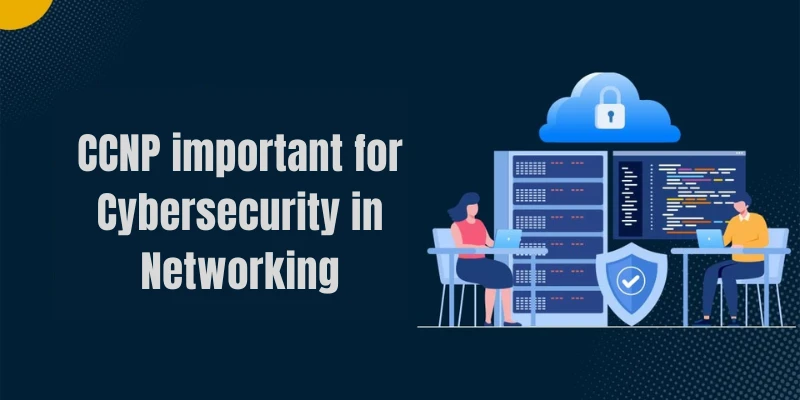
CCNP is a professional certification by Cisco that validates advanced skills in networking and cybersecurity. It equips professionals with the knowledge to secure networks using firewalls, VPNs, and intrusion prevention systems. CCNP Security is ideal for those aiming to build a career in network security, as it bridges core networking with essential cybersecurity practices. Get a valuable certification, join the CCNP Course in Chennai and boost your career in networking and cybersecurity.
What is CCNP?
The CCNP is a globally recognised IT certification offered by Cisco. It validates advanced knowledge of networking concepts, including routing, switching, troubleshooting, and network security. Cisco offers several tracks in CCNP, including CCNP Enterprise and CCNP Security, among others, each focusing on specific areas of expertise.
With a CCNP certification, professionals demonstrate their ability to manage large-scale enterprise networks while integrating robust security measures. This makes it highly valuable in the cybersecurity domain.
Importance of Networking in Cybersecurity
Before diving into the role of CCNP, it’s essential to understand how networking is closely connected with cybersecurity. A strong foundation in Linux is crucial for managing secure networks. Enroll in Linux Training in Chennai to effectively build those skills. Network infrastructure is the backbone of any IT system. Without a secure and well-managed network, sensitive data can easily fall into the wrong hands. Cybersecurity professionals rely heavily on networking skills to:
- Detect and respond to intrusions.
- Configure firewalls and access control lists.
- Secure data in transit using encryption protocols.
- Monitor traffic for anomalies and vulnerabilities.
How CCNP Contributes to Cybersecurity
1. Advanced Understanding of Network Protocols
The CCNP curriculum includes deep knowledge of protocols such as OSPF, EIGRP, BGP, and VPNs. These are not just essential for networking but are also critical when securing a network. Understanding how data flows through a network allows cybersecurity experts to detect malicious activity effectively.
2. Hands-on Experience with Cisco Security Tools
With the CCNP Security track, candidates learn how to configure and manage Cisco’s security tools, such as:
- Cisco ASA Firewall
- Cisco ISE (Identity Services Engine)
- Cisco VPN solutions
- IPS/IDS systems
CCNP professionals can join VMware Training in Chennai to advance their skills for a cloud-focused career.
3. Preparation for Real-World Threats
Cybersecurity is not just about theory; it’s about handling real-world threats. CCNP training includes labs and simulations that mimic real attacks and security breaches. Candidates learn to:
- Implement secure access policies
- Troubleshoot security incidents
- Secure network infrastructure
This hands-on approach helps professionals stay job-ready for the cybersecurity challenges they may face.
4. Bridges the Gap Between Network Admin and Security Analyst
In many organisations, network admins and security teams work together to maintain a secure environment. CCNP-certified professionals can bridge the gap by understanding both the network performance and security posture. This makes them valuable assets in incident response teams and security operations centres (SOC).
Explore the benefits of earning a CCNP Certification to boost your networking skills and career opportunities.
CCNP vs. Cybersecurity Certifications
You might wonder why choose CCNP when there are dedicated cybersecurity certifications like CEH, CompTIA Security+, or CISSP?
While those are great for cybersecurity theory and practices, CCNP offers a solid foundation in network security, which is often overlooked in other courses. Without knowing how networks operate, applying cybersecurity becomes less effective.
Enroll in the Best Training Institute in Chennai to earn top certifications and unlock easy placement opportunities in the IT industry.
Career Benefits of CCNP in Cybersecurity
Having a CCNP certification can unlock doors to roles such as:
- Network Security Engineer
- Cybersecurity Analyst
- Security Consultant
- Network Administrator (with security responsibilities)
Moreover, CCNP holders often earn higher salaries and have better job prospects in both the networking and security fields. As more companies prioritise network security, the demand for CCNP-certified professionals remains strong.
So, why is CCNP important for cybersecurity in networking? Because it equips professionals with the knowledge and tools to secure networks at an advanced level. It bridges the gap between networking and security, providing a robust foundation for defending against modern cyber threats.
Also check: Future Trends in Networking and the Role of CCNA Certification
